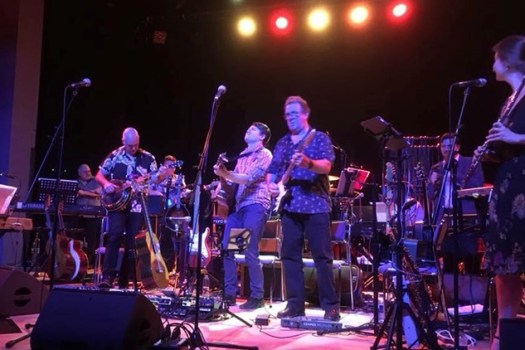
Ariadne auf Naxos, Opera North/Gothenburg Opera, Leeds Grand Theatre. Further performances on February 21, 24 and March 1, all at 7pm, then touring until March 24. Leeds box office: 0113 243 0808 or leedsheritagetheatres.com.
HUGO von Hofmannsthal avowedly based his libretto for Ariadne on the idea of Verwandlung, transformation.
Rodula Gaitanou’s ingenious scenario for this co-production with Gothenburg Opera, first seen there exactly five years ago, takes transformation a stage further, relocating the action from nouveau-riche Vienna in the 1910s to Fellini’s Rome of the 1950s, specifically the Cinecittà film studios.
George Souglides’s equally clever set and costumes underline the conceit by virtually duplicating the harlequinade costumes from Fellini’s 8 1⁄2.

The Prologue bustles with pre-cinematic activity, much of it mimed in hilarious detail behind the rantings of the Major-Domo and the Music-Master. So, we have electrician, light operator, make-up artist, painter, paparazzo and cameraman busying themselves alongside a group of sponsors – all named in the programme.
John Savournin’s no-nonsense Major-Domo rules this roost, rocking back Dean Robinson’s pleading Music-Master and Daniel Norman’s fretful Dancing-Master at every turn. Only Hanna Hipp’s firm, intense Composer offers him serious resistance, impassioned in her aria but soothed into reluctant acceptance of the new order by Zerbinetta’s attentions.
This might have been the last we would see of the Composer. But Gaitanou brings him back for the Opera, where he is a spectator throughout, even bringing realism to Zerbinetta’s emotional tug-of-love between him (her new ‘god’) and her old flame Harlequin.
Jennifer France’s flibbertigibbet of a Zerbinetta turns out to be the fulcrum around which the evening revolves. This owes much to her effervescence, but was partly caused by both the Tenor/Bacchus and the Prima Donna/Ariadne having missed the dress rehearsal for vocal reasons, although no apologies were offered on this opening night. They weathered the Prologue without distress, but for one of them (Ric Furman) the Opera proved a bridge too far.

Nothing, however, should detract from France’s splendid evening. Having blended easily with her comic troupe before the interval, she has plenty in reserve for a tour de force of coloratura in the Opera, managing more than a hint of self-parody at the same time, while in almost perpetual motion. It is riveting.
Here, too, Elizabeth Llewellyn in the title role comes into her own. She was clearly in excellent voice for her initial aria, which was smoothly controlled, no mean feat given that she had to lie on a ten-metre high granite rock, which looked extremely uncomfortable. In duet with Bacchus, she convincingly negotiated the moments of doubt about his true personality before launching into glorious tone when the love-duet finally flowered, her upper middle range particularly gleaming.
Sadly, Ric Furman’s Bacchus was unable to match her. Clearly still suffering, his tenor sounded threadbare in comparison. Presumably distracted by his vocal difficulties, he also acted as if still in doubt about any hook-up with Ariadne, even at the close.
They finished the evening upstage watching the fireworks promised by the unnamed film director, reminding us of the play within a play, as did the cameramen who were present throughout.

The evening has many other good things to offer, not least the slim-line orchestra under Antony Hermus. He is in his element in the Prologue, bringing a Mozartian jollity to Strauss’s lyrical riches. Yet he also conjures a tender intimacy from the chamber music opening of the Opera overture and velvety horn obbligato for Ariadne’s first aria, before unleashing a boisterous but disciplined finale.
The commedia dell’arte quartet manoeuvres wittily, ably led by Dominic Sedgwick’s Harlequin and Savournin’s Truffaldino. It is also a treat to have three such willowy nymphs – Daisy Brown, Laura Kelly-McInroy and Amy Freston – blending and capering alluringly, even if their constant arm-flapping, presumably suggestive of swimming, outstays its welcome. Victoria Newlyn is the otherwise engaging choreographer.
The Prologue is sung in English (translated by Christopher Cowell), Italian and German, mimicking the polyglot casts of international opera; German is used in the Opera, with English side-titles throughout. Gaitanou must have micro-directed this multi-talented cast. With Zerbinetta leading the way, Hofmannsthal’s transformation could hardly be more persuasive.
Review by Martin Dreyer









































